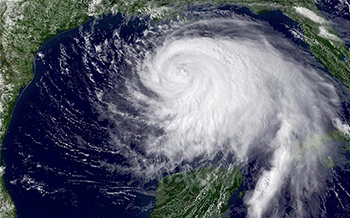
Disaster Planning for Horse Owners:
Part 3 – Storm Aftermath
 After a natural disaster such as hurricane, tornado, earthquake or flood, what should you do to help your horse? Roads may be blocked by fallen trees, flooded, or filled with live electric wires preventing help from coming to your farm.
After a natural disaster such as hurricane, tornado, earthquake or flood, what should you do to help your horse? Roads may be blocked by fallen trees, flooded, or filled with live electric wires preventing help from coming to your farm.
Check each horse thoroughly for any injury. Watch for nasal discharges and be prepared to call the vet. If you do call, follow the vet’s instructions.
Walk paddocks and pastures to ensure they are free of debris. Keep an eye open for Red Maple branches which may have been blown into the pasture. (Clinical signs of Red Maple poisoning are lethargy, weakness, breathing difficulty, anorexia and reddish-brown urine.)
Make sure run-in shed roofs are secure. Take pictures of all the damage created by the storm.
Check all fencing to make sure there are no breaks. No one wants to accidentally hit a wandering horse that found its way onto a road.
Carefully clean debris from the barn and clear out the driveway in case you need to use a truck or trailer.
Check your barn and other structures for damage. Do not return any horses to the barn unless it is structurally sound.
Place one of the signs you made in Part 2 with the appropriate side facing the road. This way your friends, neighbors and animal safety patrols will know if you need help or not. Place the other face up on the ground so helicopters or airplanes flying overhead could see if you need help. Only use the HELP side if your animal is severely injured.
 Make sure your horse is well watered. Wandering animals deprived of water for several days can suffer kidney failure due to dehydration.This is the major cause of death for horses in all kinds of disasters. Storm runoff could contain contaminants so make sure you have chlorine bleach on hand to purify water if necessary (add two drops of bleach per quart of water and let it stand for at least 30 minutes before using.)
Make sure your horse is well watered. Wandering animals deprived of water for several days can suffer kidney failure due to dehydration.This is the major cause of death for horses in all kinds of disasters. Storm runoff could contain contaminants so make sure you have chlorine bleach on hand to purify water if necessary (add two drops of bleach per quart of water and let it stand for at least 30 minutes before using.)
 Check stored feed and hay for contaminates infestations or mold. Little critters will be searching for food and you may not want to share.
Check stored feed and hay for contaminates infestations or mold. Little critters will be searching for food and you may not want to share.
Horses tend to seek the lowest areas in pastures or alongside roadways. An unfortunate horse could step into a drainage ditch that has a downed power line and be electrocuted. If this should happen, leave the animal untouched and let professional remove the carcass.
Use plenty of fly-repellant to fight mosquito-borne disease, especially if there has been any flooding in the area.
Keep your eyes open for snakes, skunks, raccoons, opossums, coyotes or other wildlife that may seek refuge in your pasture or barn. Clean out all fecal matter, feed and hay the critters may have gotten into.
Most importantly of all, check your horse as often as you can. A small wound not seen initially may become infected and require medical attention. Infectious diseases may appear especially West Nile virus, Eastern and Western Equine Encephalitis, Anthrax poisoning, Botulism, Tetanus, EPM, and Equine Infectious Anemia.
In other words, you notice anything unusual in the appearance or behavior of your horse, immediately call your vet.
Staying prepared is your best defense for natural disasters. Your horses are your family – protect them the best you can.
* The information provided here is intended to be a brief summary. Please contact Star H Equine Insurance and/or review your policy for more detailed information.
Copyright © 2015 -
Star H Equine Insurance. All rights reserved
- Web/Graphic Design & Site Maintenance Karin Hinzmann



 We are licensed in all states but Alaska!
We are licensed in all states but Alaska!